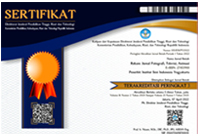Strategi Resiliensi Museum dan Galeri Foto Jurnalistik Antara Menghadapi Pandemi Covid-19
Abstract
The implementation of the Large-Scale Social Restrictions (PSBB) policy in order to reduce the number of transmission of the coronavirus (Covid-19) pandemic cases in Jakarta leads several cultural heritage sites such as museums close the physical access to visits. In the midst of these limitations, the Antara Journalistic Museum and Photo Gallery made a breakthrough by establishing the museum digitization approach using Video Reality (VR) technology. This article was written to see how the strategy for the resilience of Cultural Heritage Sites in the Museum and Journalistic Photo Gallery is between maintaining some journalistic photo exhibition agendas amidst the lack of public interest in visiting museums plus the threat of a multidimensional crisis due to the Covid-19 pandemic. This research was written using qualitative methods with a descriptive approach. The existence of this facility provides a new alternative for the public to continue visiting and accessing journalistic photo exhibition programs and activities which have been regularly held at the Antara Museum and Photo Journalistic Gallery so far. Having concern with the strength of the mission to preserve historical value as one of the broadcasting spaces for independence and to disseminate journalistic knowledge, especially related to the photojournalism to the younger generation and the strong encouragement of the community, the Antara Journalistic Photo Gallery and Museum is encouraged to survive and continue to operate in organizing activities that have been consistently scheduled yearly.
Keywords
Full Text:
PDFReferences
Agostino, D., Arnaboldi, M., & Lampis, A. (2020). Italian state museums during the COVID-19 crisis: from onsite closure to online openness. Museum Management and Curatorship, 0(0), 1–11. https://doi.org/10.1080/09647775.2020.1790029
Alcaraz, C., Hume, M., & Mort, G. S. (2009). Creating sustainable practice in a museum context: Adopting service-centricity in non-profit museums. Australasian Marketing Journal, 17(4), 219–225. https://doi.org/10.1016/j.ausmj.2009.06.003
AMI. (2016). Daftar Museum Seluruh Indonesia. Asosiasi Museum Indonesia. https://asosiasimuseumindonesia.org/anggota.html
Antara. (2016). Histori Masa Depan. Kantor Berita Antara.
Antopani, T. (2016). Fotografi, Pariwisata, Dan Media Aktualisasi Diri. REKAM: Jurnal Fotografi, Televisi, Dan Animasi, 11(1), 31. https://doi.org/10.24821/rekam.v11i1.1293
Creswell, J. W. (2014). Research design: qualitative, quantitative, and mixed methods approaches (4th ed.). SAGE Publications.
Elo, S., Kääriäinen, M., Kanste, O., Pölkki, T., Utriainen, K., & Kyngäs, H. (2014). Qualitative Content Analysis. SAGE Open, 4(1), 215824401452263. https://doi.org/10.1177/2158244014522633
Errichiello, L., Micera, R., Atzeni, M., & Del Chiappa, G. (2019). Exploring the implications of wearable virtual reality technology for museum visitors’ experience: A cluster analysis. International Journal of Tourism Research, 21(5), 590–605. https://doi.org/10.1002/jtr.2283
Guttentag, D. A. (2010). Virtual reality: Applications and implications for tourism. Tourism Management, 31(5), 637–651. https://doi.org/10.1016/j.tourman.2009.07.003
Hidayat, R. (2017). Virtual Reality Pameran Arsip dan Koleksi Indonesia Press Photo Service ( Studi Kasus: Galeri Foto Jurnalistik Antara). UIN Syarif Hidayatullah.
Huang, Y. C., Backman, S. J., Backman, K. F., & Moore, D. W. (2013). Exploring user acceptance of 3D virtual worlds in travel and tourism marketing. Tourism Management, 36, 490–501. https://doi.org/10.1016/j.tourman.2012.09.009
ICOMOS. (2012). International Scientific Commitee on Cultural Tourism Principle and Practice. In Cultural Tourism for Community Development: 40 Years of the World Heritage Convention Vigan, Philippines, 5-10th November. http://icomos-ictc.org/wp-content/uploads/2017/11/Publications-PDF-1-Sue-Millar-Presidents-address-Vigan-Philippines-2012.pdf
Ismanto, I. (2018). Budaya Selfie Masyarakat Urban Kajian Estetika Fotografi, Cyber Culture, dan Semiotika Visual. REKAM: Jurnal Fotografi, Televisi, Dan Animasi, 14(1), 67. https://doi.org/10.24821/rekam.v14i1.2138
Junaid, I. (2017). Museum dalam perspektif pariwisata dan pendidikan. Dinas kebudayaan dan pariwisata provinsi sulawesi selatan.
Jung, T., Dieck, T., M. C., Lee, H., & Chung, N. (2016). Effects of virtual reality and augmented reality on visitor experiences in museum. Springer.
Kędra, J. (2016). Enhancing visual literacy through interpretation of photo-genres: toward a genre typology of journalistic photographs. Journal of Media Practice, 17(1), 28–47. https://doi.org/10.1080/14682753.2016.1159451
Khairunnisa, S. N., Srimulyani, H., & Zulfan, I. (2020). Konstruksi Makna Aktivitas Jurnalistik Bagi Pelajar Anggota Komunitas Hai School Crew. Jurnal Kajian Jurnalisme, 4(1), 75. https://doi.org/10.24198/jkj.v4i1.26614
Khoirnafiya, S. (2012). Peranan Museum Bagi Masyarakat Masa Kini. https://museumku.wordpress.com/2012/01/16/peranan-museum-bagi-masyarakat-masa-kini/
Kriyantono, R., & Sos, S. (2014). Teknik praktis riset komunikasi. Prenada Media. Prenada Media.
Laba, K., Rusmiwari, S., & Diahloka, C. (2015). Representase Visi Surat Kabar dalam Foto Jurnalistik. Jisip, 2(1), 15–19. https://publikasi.unitri.ac.id/index.php/fisip/article/view/61
Mathwick, C., Malhotra, N., & Rigdon, E. (2001). Experiential value: Conceptualization, measurement and application in the catalog and Internet shopping environment. Journal of Retailing, 77(1), 39–56. https://doi.org/10.1016/S0022-4359(00)00045-2
Maulida, L. (2018). Penerapan Datamining Dalam Mengelompokkan Kunjungan Wisatawan Ke Objek Wisata Unggulan Di Prov. Dki Jakarta Dengan K-Means. JISKA (Jurnal Informatika Sunan Kalijaga), 2(3), 167. https://doi.org/10.14421/jiska.2018.23-06
Oun, M. A., & Bach, C. (2014). Qualitative research method summary. Journal of Multidisciplinary Engineering Science and Technology, 1(5), 151–161.
Prasetya, A. (2009). Apresiasi dalam fotografi : sebuah pengantar dalam membaca, memahami, dan mengapreseiasi fotografi.
Journal Wimba, 01(1), 87–93.
Sahrah, A. (2020). Studi Indigenous Dengan Metode Kualitatif (Cetakan 1, Vol. 7, Issue 2). Gramasurya.
Setkab. (2020). Dari 435 Museum Terdaftar, Kemendikbud: 100
Museum Masuk Kategori Tidak Layak. https://setkab.go.id/dari-435-museum-terdaftar-kemendikbud-100-museum-masuk-kategori-tidak-layak/
Somantri, G. R. (2005). Memahami Metode Kualitatif. Makara, Sosial Humaniora, 9(5), 26.
Sugiyono. (2017). Metode Penelitian Kuantitatif, Kualitatif dan R&D. Alfabeta.
Tempo. (2000). “Kematian” di Gedung Tua. https://majalah.tempo.co/read/fotografi/112503/kematian-di-gedung-tua
Thyne, M. (2001). The importance of values research for nonprofit organisations: the motivation-based values of museum visitors. International Journal of Nonprofit and Voluntary Sector Marketing, 6(2), 116–130. https://doi.org/10.1002/nvsm.140
UNESCO. (2020). Definition of Museum. UNESCO. http://uis.unesco.org/en/glossary-term/museum
Wahab, M. H. A., & Zuhardi, A. F. A. (2013). Human Visual Quality: Art Gallery Exhibition. Procedia - Social and Behavioral Sciences, 101, 476–487. https://doi.org/10.1016/j.sbspro.2013.07.221
Yendra, S. (2019). Museum dan Galeri (Tantangan dan Solusi). Jurnal Tata Kelola Seni, 4(2), 103–108. https://doi.org/10.24821/jtks.v4i2.3088
Uwan. (2020, 6 Desember). Wawancara
DOI: https://doi.org/10.24821/rekam.v17i1.4945
Refbacks
- There are currently no refbacks.

This work is licensed under a Creative Commons Attribution 4.0 International License.



